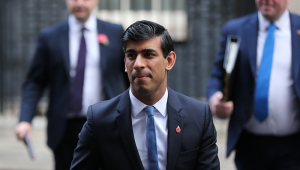The chancellor had a spring in his step yesterday.
Contrary to reports that he was an “Eeyore”, Philip Hammond labelled himself “Tigger-like” when presenting his Spring Statement.
He identified “light at the end of the tunnel” for public finances.
The reasons, the chancellor explained, were that the Office for Budget Responsibility revised the deficit and debt down, GDP growth figures up and noted improved productivity growth. This follows recent news that day-to-day government spending was balanced for the first time in over a decade.
The significance of these revisions is perhaps not as large as the chancellor reveals, however.
The OBR states that since November’s Budget, “the outlook for the economy and public finances looks broadly the same.”
The budget deficit is £4.7bn lower than forecast in November because of larger than expected tax receipts, but this is much less than the £7 billion to £11 billion downward revision expected before the Statement. The deficit remains at £45.2 billion – or four times the size of the police budget.
GDP growth may have been revised up by 0.2% in 2017, to 1.7%, but it is the slowest of G7 economies. Sluggish growth costs tax receipts that can be used to reduce the deficit and debt.
The chancellor has been drier on the state of the debt. At the weekend he explained: “We have to get our debt lower”.
Yesterday, Hammond celebrated the reduction of this debt and explained that the government would take a “balanced approach” to spending to ensure that this is not unduly added to – ensuring that the economy is resilient in the face of future economic shocks.
The chancellor reminded the country that he does not think he has “abolished the economic cycle.”
Which all begs the question of: what next for public spending?
The chancellor promised very little extra spending today. £80m was “released” to support SMEs to engage apprenticeships.
HM Treasury announced the allocations of the £1.5bn Brexit contingency spend today, but this had already been set aside.
Money was set aside for affordable housing, including £1.7 billion additional funding in London, as well as agreements for housing targets in the West Midlands.
The chancellor may well loosen spending at the Budget.
He retains his £15bn war chest (cut from £26bn at the November Budget) by 2020-21, which is the forecast room he has to meet his target of reducing the deficit to 2% of GDP.
The chancellor hinted at “further increases in public spending and investment in the years ahead” if public finances “continue to reflect the improvements that today’s report hints at.”
This offers the chancellor wiggle room, assuming no downgrade of growth, tax receipts or productivity.
But structural issues with funding public services remain.
The OBR’s 2017 assessment that in the long term public finances are “unsustainable” still stands.
The ageing population will put increasing pressure on the NHS and social care – which will result in another winter crisis with no change to the healthcare model.
A growing school population requires more efficient teaching to keep pace, and more effective teaching if the country is to compete with international peers.
The “broken” housing market requires regulatory overhaul, to planning permission, for example and not just extra cash or government-backed loans.
Looking ahead to November, as the Chancellor invited us to, reveals that deeper thinking, not just efficiency savings are needed to meet the deficit and debt challenges in the longer term, while, as the chancellor rightly said, achieving value for money from every penny of taxpayer money spent.
These are the challenges that the chancellor needs to deal with to, as he put it, “give the next generation a fair chance”.
Falling debt is one way of achieving this, and the chancellor was right to celebrate this yesterday.
Spending taxpayer money on key services more strategically needs to be his priority for tomorrow.





















